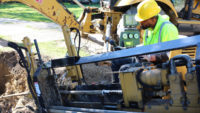The city of Flint, Mich., and a group of plaintiffs who sued the city have reached an agreement setting a new deadline to complete lead water line replacements after the city again missed its court-approved deadline last fall.
Under the agreement filed in a federal court in Ann Arbor, the city must complete excavations and replacements at all of the 31,758 eligible homes by Aug. 1. For homes where replacements have already been done and those that are done by March 1, the city must complete restoration by June 30. For properties with replacements done after March 2, restoration must be done within four months of excavations.
Also, the city must provide weekly progress reports to the plaintiffs, who include the groups Concerned Pastors for Social Action, American Civil Liberties Union of Michigan and Natural Resources Defense Council, as well as Melissa Mays, a Flint resident and operations manager at community advocacy group Flint Rising.
Flint Rising has been working to inform residents of their right to replacement water service lines and property restoration, but Mays says the city has been needlessly delaying work. Ahead of last year’s Sept. 30 deadline, she says the city did not even perform any work until after Labor Day.
“They’re trying to put an end to this without finishing the job,” Mays says.
A Flint spokesperson did not respond to inquiries about the city’s progress with the replacements. Last fall, after missing the last deadline, city officials said they had completed more than 27,000 excavations and that contracts were in place with Rowe Professional Services Co. and Lakeshore Global Corp. to complete the remaining work. The U.S. Environmental Protection Agency also granted Flint a one-year extension to use $100 million in federal funding for the work.
The groups sued Flint after the city’s lead-in-water crisis came to light in 2014. Service line replacement work was originally supposed to last about three years, but work stopped in 2020 during the COVID-19 pandemic as officials said it was unsafe for workers to enter residents’ homes. Delays have continued, and in November the plaintiffs filed their fifth motion to enforce the settlement agreement.
Residents also complained that the city did not restore many properties after the replacements were done, leaving broken pavement and mounds of dirt. Last August, city officials said about 8,000 properties still needed restoration, but Mays says that number may be even higher.
“We don’t know how many homes actually still need to be done,” Mays says. “We don’t know how many homes still need restoration, and [the city is] not even counting that in [its tallies of completed work].”
In a separate lawsuit, engineering firm Lockwood Andrews & Newnam Inc. last month agreed to settle a case accusing it of professional negligence in its work for the city. Details of the settlement were filed under seal. An attorney representing LAN said the company wants to avoid the costs of a second trial after a deadlocked jury prompted a judge to declare a mistrial in the case last summer. A retrial is still pending for engineering firm Veolia Water North America Operating Services LLC, which was also accused in the suit.





